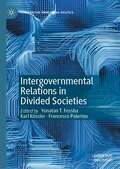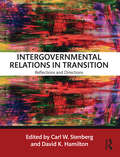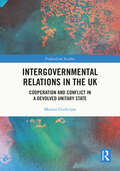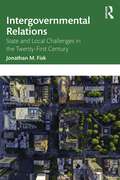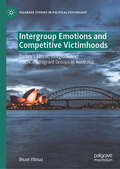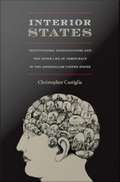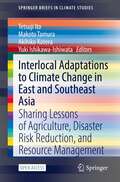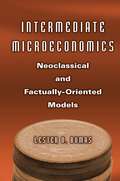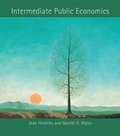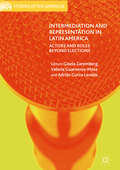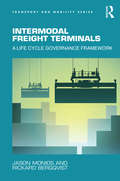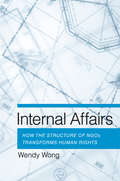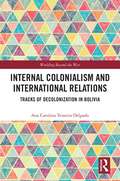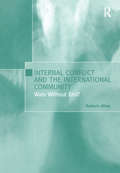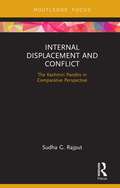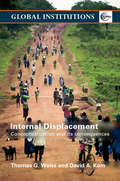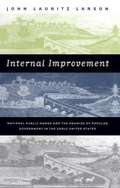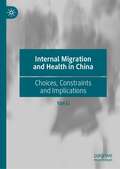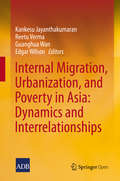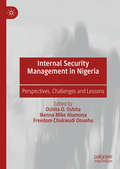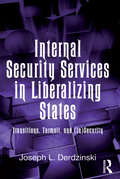- Table View
- List View
Intergovernmental Relations in Divided Societies (Comparative Territorial Politics)
by Francesco Palermo Karl Kössler Yonatan T. FesshaThis edited volume examines the form and operation of intergovernmental relations in divided societies. Using eight country case studies, it explores the interplay between politicised ethno-cultural diversity and intergovernmental relations (IGR) in countries where the distinctive identity of at least one subnational unit is acknowledged in a form of territorial autonomy. The book examines whether and how the distinctive identity of particular subnational units and the attending competing constitutional visions shape the dynamics of IGR. The goal here is not simply to determine whether intergovernmental interactions in such societies are less cordial and more conflictual than in other societies. Such interaction in any society could be strained as a result of disagreement over specific policy objectives. The question is whether the distinctive identity of particular subnational units and the attending competing constitutional visions themselves have been a primary source of intergovernmental tension. The book also examines the impact of identity politics on institutions and instruments of IGR, determining whether the ethno-cultural divide and the tension it creates have the tendency to affect the type of institutions and instruments employed in IGR. It is also about the relevance and effectiveness of institutions and instruments of IGR in acknowledging and accommodating the distinctive identities and specific demands of subnational units, thereby contributing to the peaceful management of divided societies.
Intergovernmental Relations in Transition: Reflections and Directions
by David K. Hamilton Carl W. StenbergThe field of intergovernmental relations has changed substantially over the past five decades. It maintains a critical and evolving role in the US federal system as well as in public policy and administration. Building upon the legacy of Deil S.Wright’s scholarship, this collection of essays by distinguished scholars, emerging thought leaders, and experienced practitioners chronicles and analyzes some of the tensions and pressures that have contributed to the current state of intergovernmental relations and management. Although rarely commanding media attention by name, intergovernmental relations is being elevated in the public discourse through policy issues dominating the headlines. Many of these intergovernmental issues are addressed in this book, including health insurance exchanges under the now-threatened Affordable Care Act, and the roles of the federal, state, and local governments in food safety, energy, and climate change.Contributors interpret and assess the impacts of these and other issues on the future directions of intergovernmental relations and management. This book will serve as an ideal text for courses on intergovernmental relations and federalism, and will be of interest to government practitioners and civic and nonprofit organization leaders involved in public policy and management.
Intergovernmental Relations in the UK: Cooperation and Conflict in a Devolved Unitary State (Federalism Studies)
by Marius GuderjanIntergovernmental Relations in the UK provides a timely and up-to-date analysis of a turbulent decade in British politics and presents a fascinating case study of intergovernmental relations and territorial power in a devolved unitary state. As over time a widening range of powers has been transferred from the Westminster Parliament to the devolved legislatures in Scotland, Wales and Northern Ireland, intergovernmental relations have become increasingly important to deal with the corresponding overlaps of legislative and fiscal authority. However, leaving the European Union has exposed the weakness of the intergovernmental architecture and challenged the functionality of the UK’s multilevel polity. Until now, the question of how powerful the devolved administrations really are has not been satisfactorily answered. The author uses insights from comparative studies of federations to develop a systematic account of shared rule and intergovernmental relations. This book examines how informal institutions and practices can provide political influence beyond formal structures, with reference to an extensive range of institutions, practices, policies and political decisions. Unlike other studies focused predominantly on the state of the Union, this volume points to the interplay between conflict and cooperation, and demonstrates that the proclaimed ‘break-up of the Union’ is accompanied by efforts to integrate the different jurisdictions. This book will be of interest to scholars and postgraduate students of comparative politics, political systems, multilevel governance, regional and federal studies, British politics and public administration. It will also appeal to politicians, government advisers, civil servants and other practitioners who seek a better, more nuanced understanding of the UK’s multilevel constitution and politics, and the nature of intergovernmental relations in the UK.
Intergovernmental Relations: State and Local Challenges in the Twenty-First Century
by Jonathan M. FiskWho governs? On the surface, such a question should be easy to answer by simply reading the law. Taking a deeper examination, it is one of the most hotly contested questions, often without a clear-cut answer. With recent controversies in the United States related to confederate monuments, transgender rights, and unconventional oil and gas development, for example, the answer is: it depends and is subject to change. Intergovernmental Relations: State and Local Challenges in the Twenty-First Century examines the sources behind state-local conflict to better understand where this critical intergovernmental relationship may be breaking down, and to ultimately identify solutions and policy tools that build upon the strengths of state and local governments, mitigate conflicts, and improve the quality of life for citizens. Author Jonathan M. Fisk begins by defining the basic institutional structures and offices and addressing the intergovernmental legal environment. He then offers a framework for understanding possible sources behind state-local conflict, with a recognition that intergovernmental relationships have historical roots, are place-based, and dependent on context, before examining concrete issues that have become ensnared in intergovernmental conflict via case studies including environmental (plastic bags, climate change), social and constitutional (confederate statues, transgender bathrooms), and economic (living wage, affordable housing) to name a few. Each case study possesses its own history, intergovernmental actors, costs, benefits, opportunities, and challenges. Readers are asked to confront difficult questions about property and constitutional rights, intergenerational equity, economic growth, wage fairness, and local democracy. This book offers an ideal supplement for students enrolled in courses on public policy, federalism, state and local government, and public administration.
Intergovernmental Relations: State and Local Challenges in the Twenty-First Century
by Jonathan M. FiskWho governs? On the surface, such a question should be easy to answer by simply reading the law. Taking a deeper examination, it is one of the most hotly contested questions, often without a clear-cut answer. With recent controversies in the United States related to confederate monuments, transgender rights, and unconventional oil and gas development, for example, the answer is: it depends and is subject to change. Intergovernmental Relations: State and Local Challenges in the Twenty-First Century examines the sources behind state-local conflict to better understand where this critical intergovernmental relationship may be breaking down, and to ultimately identify solutions and policy tools that build upon the strengths of state and local governments, mitigate conflicts, and improve the quality of life for citizens. Author Jonathan M. Fisk begins by defining the basic institutional structures and offices and addressing the intergovernmental legal environment. He then offers a framework for understanding possible sources behind state-local conflict, with a recognition that intergovernmental relationships have historical roots, are place-based, and dependent on context, before examining concrete issues that have become ensnared in intergovernmental conflict via case studies including environmental (plastic bags, climate change), social and constitutional (confederate statues, transgender bathrooms), and economic (living wage, affordable housing) to name a few. Each case study possesses its own history, intergovernmental actors, costs, benefits, opportunities, and challenges. Readers are asked to confront difficult questions about property and constitutional rights, intergenerational equity, economic growth, wage fairness, and local democracy. This book offers an ideal supplement for students enrolled in courses on public policy, federalism, state and local government, and public administration.
Intergroup Emotions and Competitive Victimhoods: Turkey’s Ethnic, Religious and Political Emigrant Groups in Australia (Palgrave Studies in Political Psychology)
by Ihsan YilmazThis book examines the narratives and collective emotions of diaspora groups who originate from Turkey and now live in Australia, focusing on their experiences of collective victimhood, competitive victimhood, and intergroup emotions in relation to other diaspora groups from Turkey. Based on 122 semi-structured extensive interviews with Armenians, Kurds, Alevis, Gülenists, Kemalists and Erdoğanists, the book argues that, while in power, dominant groups driven by competitive victimhood often exhibit indifference toward the victimhood of other groups. This dynamic reflects how ressentiment can perpetuate cycles of oppression and antagonism. However, this pattern can shift when powerful groups find themselves in opposition. In such scenarios, they may become more attuned to the grievances of other groups.
Interior Freedom
by Jacques PhilippeInterior Freedom leads one to discover that even in the most difficult circumstances we possess within ourselves a space of freedom that nobody can take away, because God is its source and guarantee. Without this discovery we will always be restricted in some way and will never taste true happiness. Author Jacques Philippe develops a simple but important theme: we gain possession of our interior freedom in exact proportion to our growth in faith, hope, and love. He explains that the dynamism between these three theological virtues is the heart of the spiritual life, and he underlines the key role of the virtue of hope in our inner growth.
Interior States: Institutional Consciousness and the Inner Life of Democracy in the Antebellum United States
by Christopher CastigliaIn Interior States Christopher Castiglia focuses on U. S. citizens' democratic impulse: their ability to work with others to imagine genuinely democratic publics while taking divergent views into account. Castiglia contends that citizens of the early United States were encouraged to locate this social impulse not in associations with others but in the turbulent and conflicted interiors of their own bodies. He describes how the human interior--with its battles between appetite and restraint, desire and deferral--became a displacement of the divided sociality of nineteenth-century America's public sphere and contributed to the vanishing of that sphere in the twentieth century and the twenty-first. Drawing insightful connections between political structures, social relations, and cultural forms, he explains that as the interior came to reflect the ideological conflicts of the social world, citizens were encouraged to (mis)understand vigilant self-scrutiny and self-management as effective democratic action. In the late eighteenth century and early nineteenth, as discourses of interiority gained prominence, so did powerful counter-narratives. Castiglia reveals the flamboyant pages of antebellum popular fiction to be an archive of unruly democratic aspirations. Through close readings of works by Maria Monk and George Lippard, Walt Whitman and Timothy Shay Arthur, Hannah Webster Foster and Hannah Crafts, and Nathaniel Hawthorne and Herman Melville, Castiglia highlights a refusal to be reformed or self-contained. In antebellum authors' representations of nervousness, desire, appetite, fantasy, and imagination, he finds democratic strivings that refused to disappear. Taking inspiration from those writers and turning to the present, Castiglia advocates a humanism-without-humans that, denied the adjudicative power of interiority, promises to release democracy from its inner life and to return it to the public sphere where U. S. citizens may yet create unprecedented possibilities for social action.
Interkulturelle Räume im Spielfilm: Eine filmgeographische Analyse am Beispiel von New York City (Perspektiven der Humangeographie)
by Elisabeth Nora SommerladSpielfilme imaginieren New York City oft als eine Stadt, in der das alltägliche Zusammenleben durch interkulturelle Begegnungen konstituiert wird. Das vorliegende Buch nimmt sich diesem Topos an. Die filmgeographische Studie analysiert, wie Spielfilme interkulturelle Begegnungen inszenieren. Die Autorin erarbeitet anhand von 17 US-amerikanischen Spielfilmen, wie interkulturelle Begegnungen strategisch inszeniert werden. Hierbei hinterfragt sie kritisch die Darstellungen gesellschaftlicher Herausforderungen, welche sich im Kontext des dargebotenen Miteinanders ergeben. Das Ergebnis sind sechs vielschichtige Dimensionen interkultureller Räume. Diese offenbaren, dass NYC letztlich vor allem als Stadt kultureller Koexistenz inszeniert wird – als Projektionsfolie einer Gesellschaft, in der sich Individuen anhand diffuser kultureller Marker beständig voneinander abgrenzen. Die Studie liefert damit einen Beitrag zum mediensensiblen Diskurs über interkulturelle Fragestellungen, denen in globalisierten, kulturell diversen und medienaffinen Gesellschaften höchste Relevanz zukommt.
Interlocal Adaptations to Climate Change in East and Southeast Asia: Sharing Lessons of Agriculture, Disaster Risk Reduction, and Resource Management (SpringerBriefs in Climate Studies)
by Tetsuji Ito Makoto Tamura Akihiko Kotera Yuki Ishikawa-IshiwataThis Open Access book’s main focus is agriculture and natural resource management, disaster risk reduction, and human resource development in the countries of East and Southeast Asia and Japan.Asia is one of the regions which is the most vulnerable to the impacts of climate change. More than sixty percent of the world’s people live in the region, making it the growth center of the world. Asia is vast and includes various countries and regions, this book is focused on East and Southeast Asia including Japan. It is essential to share the knowledge and experiences for adapting climate change among these areas.In order to tackle these issues, the book aims to:Promote inter-local lessons learnt sharing climate change adaptations; "agriculture and natural resource management" and "disaster risk reduction and human resource development"Provides insights into new adaptation measures and research approaches that can consider the regional nature of Southeast AsiaShare practical adaptation options permeated by society in each country/regionThis book will be of interest to researchers and students examining climate change impacts in East and Southeast Asia.
Intermediate Microeconomics: Neoclassical and Factually-oriented Models
by Lester O. BumasThis is the first intermediate microeconomics textbook to offer both a theoretical and real-world grounding in the subject. Relying on simple algebraic equations, and developed over years of classroom testing, it covers factually oriented models in addition to the neoclassical paradigm, and goes beyond theoretical analysis to consider practical realities.
Intermediate Public Economics
by Jean Hindriks Gareth D. MylesPublic economics studies how government taxing and spending activities affect the economy--economic efficiency and the distribution of income and wealth. This comprehensive text in public economics covers the core topics market failure and taxation as well as recent developments in the political economy and public choice literatures. It is unique not only in its broad scope but in its balance between public finance and public choice and its combination of theory and relevant empirical evidence. After introducing the theory and methodology of public economics and reviewing the efficiency of the competitive equilibrium, the book presents a historical and theoretical overview of the public sector. It then discusses departures from efficiency, including imperfect competition and asymmetric information; issues in political economy, including rent-seeking (a topic often omitted from other texts); equity; taxation issues, including tax evasion and its consequences; fiscal federalism and tax competition among independent jurisdictions; and the intertemporal issues of social security and economic growth. This text introduces the reader to the theory of public economics and the most significant results of the analysis, providing an overview of the current state of the field. It is accessible to anyone with a background of intermediate microeconomics and macroeconomics and can be used in advanced undergraduate as well as graduate courses. Although the mathematics has been kept to a minimum, the book remains analytical rather than discursive. Annotated suggestions for further reading and numerous exercises are included at the end of each chapter.
Intermediation and Representation in Latin America
by Gisela Zaremberg Valeria Guarneros-Meza Adrián Gurza LavalleThis book shows how the introduction of intermediation is relevant in studying political and public policy processes, as they are increasingly accompanied by grey spaces in public and non-public arenas that cannot be categorized as purely representative or purely participative. Instead, 'hybrid' mechanisms are developing in the policy-making process, which bring in new actors who either are unelected while being required to represent or advocate for the common good of others or are directly elected but challenged by identity/rights-based issues of the people they are required to act in the best interest of. By proposing a conceptual frame on intermediation and addressing five different Latin American countries and a wide range of case studies --from human rights, labour relations, neighbourhood management, municipal bureaucracies, social accountability, to complex national systems of citizen participation--this volume shows the versatility and validity of a tridimensional frame, the "cube of political intermediation" (CPI) as a tool for analysing public policy and understanding contemporary democratic innovation in Latin America.
Intermodal Freight Terminals: A Life Cycle Governance Framework (Transport and Mobility)
by Jason Monios Rickard BergqvistMuch work has been done on port governance yet little has addressed intermodal terminal governance, despite the clear similarities. This book fills that gap by establishing a governance framework for situating analysis of intermodal terminals throughout their life cycle. A version of the product life cycle theory is amended with governance theory to produce a framework covering each stage of the terminal’s life cycle, from the initial planning to the many decisions taken regarding the public/private split in funding mechanisms, ownership, selecting an operator, specifying KPIs to the operator, setting fees, earning profit, ensuring fair access to all rail service operators, and finally to reconcessioning the terminal to a new operator, managing the handover and maintaining the terminal throughout its life cycle. An institutional analysis of stakeholder relations, situated within a governance framework, illuminates these issues and enables not only conceptualisation and greater understanding of the geography of intermodal transport, but also decision-making and goal-setting by planners and policy makers. This book thus has three functions: first, as a textbook on the planning and operation of intermodal terminals; second, as a presentation of recent empirical research on intermodal terminal governance; third, as a framework for future research in which the broad field of analysis of intermodal transport can be viewed through a single lens and used to inform geographers, policymakers and planners.
Intern Nation
by Ross PerlinMillions of young people--and increasingly some not-so-young people--now work as interns. They famously shuttle coffee in a thousand magazine offices, legislative backrooms, and Hollywood studios, but they also deliver aid in Afghanistan, map the human genome, and pick up garbage. Intern Nation is the first exposé of the exploitative world of internships. In this witty, astonishing, and serious investigative work, Ross Perlin profiles fellow interns, talks to academics and professionals about what unleashed this phenomenon, and explains why the intern boom is perverting workplace practices around the world.The hardcover publication of this book precipitated a torrent of media coverage in the US and UK, and Perlin has added an entirely new afterword describing the growing focus on this woefully underreported story. Insightful and humorous, Intern Nation will transform the way we think about the culture of work.
Internal Affairs: How the Structure of NGOs Transforms Human Rights
by Wendy H. WongWhy are some international nongovernmental organizations (NGOs) more politically salient than others, and why are some NGOs better able to influence the norms of human rights? Internal Affairs shows how the organizational structures of human rights NGOs and their campaigns determine their influence on policy. Drawing on data from seven major international organizations-the International Committee of the Red Cross, Amnesty International, Human Rights Watch, Médecins sans Frontières, Oxfam International, Anti-Slavery International, and the International League of Human Rights-Wendy H. Wong demonstrates that NGOs that choose to centralize agenda-setting and decentralize the implementation of that agenda are more successful in gaining traction in international politics.Challenging the conventional wisdom that the most successful NGOs are those that find the "right" cause or have the most resources, Wong shows that how NGOs make and implement decisions is critical to their effectiveness in influencing international norms about human rights. Building on the insights of network theory and organizational sociology, Wong traces how power works within NGOs and affects their external authority. The internal coherence of an organization, as reflected in its public statements and actions, goes a long way to assure its influence over the often tumultuous elements of the international human rights landscape.
Internal Colonialism and International Relations: Tracks of Decolonization in Bolivia (Worlding Beyond the West)
by Ana Carolina Teixeira DelgadoThis book investigates decolonization as a local process and its connections to international relations, introducing "internal colonialism" as a crucial analytical category for internationalists. Using Bolivia as a case study, the author argues that the reshaping of colonialism and its resistance domestically is also reflected and reproduced abroad by political actors, be they the governments or indigenous movements.By problematizing postcolonial debate concerning the constitution/reproduction of colonial logics in International Relations, the book proposes a return to the local to show how power relations are exercised concretely by the protagonists of political process. Such dynamics reveal the interrelationship between the local and the international, especially, in which the latter represents a necessary dimension to both reinforce colonialism and oppose colonial logics.Of interest to scholars and students of IR, Latin American and Andean Studies, this book will also appeal to those working in the fields of area studies, anthropology, indigenous politics, comparative politics, decolonization and political ecology.
Internal Conflict and the International Community: Wars Without End?
by Roderic AlleyThis insightful book debates whether conflict within states has emerged as the Achilles Heel of the international community. It covers a wide-range of issues including the roots of internal conflict, small arms supplies, intervention, human rights and international humanitarian law, refugees and post-conflict reconstruction. Internal Conflict and the International Community provides supplementary reading for third level undergraduates, post-graduates and scholars of international relations, comparative politics, development studies, international law and security and defence studies.
Internal Displacement and Conflict: The Kashmiri Pandits in Comparative Perspective
by Sudha RajputGrounded in multidisciplinary research, this book presents a methodical understanding of those displaced within their national borders, the Internally Displaced Persons (IDPs). The IDP phenomenon remains less understood than that of refugees due to the "internal" nature of the crisis, linked to a nation’s sovereignty, which assigns the responsibility for care to the national actors as opposed to an international body. However, the IDP phenomenon poses an international humanitarian challenge, with upwards of 40 million people currently in internal displacement across the globe. This book helps answer the most perplexing questions surrounding conflict-induced protracted displacements: namely, how do positions embraced by key actors inform/influence IDP policies, and why, despite the promise of robust return packages, do families remain reluctant to return to home communities and equally reluctant to embrace new host communities? Capitalizing on the diagnostic tool kit known as Dugan’s Nested Model, uniquely adapted to the Kashmiri Pandit displacement, this book also analyzes issues of the similarly displaced communities of Nagorno-Karabakh, Abkhazia and South Ossetia, Kosovo, and Darfur regions. This book will be of much interest to students of peace and conflict studies, humanitarianism, Asian politics, and International Law in general.
Internal Displacement: Conceptualization and its Consequences (Global Institutions)
by Thomas G. Weiss David A. KornThis new volume traces the normative, legal, institutional, and political responses to the challenges of assisting and protecting internally displaced persons (IDPs). The crisis of IDPs was first confronted in the 1980s, and the problems of those suffering from this type of forced migration has grown continually since then. Drawing on official and confidential documents as well as interviews with leading personalities, Internal Displacement provides an unparalleled analysis of this important issue and includes: an exploration of the phenomenon of internal displacement and of policy research about it a review of efforts to increase awareness about the plight of IDPs and the development of a legal framework to protect them a 'behind-the-scenes' look at the creation and evolution of the mandate of the Representative of the Secretary-General on IDPs a variety of case studies illustrating the difficulties in overcoming the operational shortcomings within the UN system a foreword by former UN high commissioner for refugees, Sadako Ogata. Internal Displacement will appeal to students and scholars with interests in war and peace, forced migration, human rights and global governance.
Internal Improvement
by John Lauritz LarsonWhen the people of British North America threw off their colonial bonds, they sought more than freedom from bad government: most of the founding generation also desired the freedom to create and enjoy good, popular, responsive government. This book traces the central issue on which early Americans pinned their hopes for positive government action--internal improvement. The nation's early republican governments undertook a wide range of internal improvement projects meant to assure Americans' security, prosperity, and enlightenment--from the building of roads, canals, and bridges to the establishment of universities and libraries. But competitive struggles eventually undermined the interstate and interregional cooperation required, and the public soured on the internal improvement movement. Jacksonian politicians seized this opportunity to promote a more libertarian political philosophy in place of activist, positive republicanism. By the 1850s, the United States had turned toward a laissez-faire system of policy that, ironically, guaranteed more freedom for capitalists and entrepreneurs than ever envisioned in the founders' revolutionary republicanism.
Internal Migration and Health in China: Choices, Constraints and Implications
by Yan LiThis book focuses on the multifaceted reality of social and health constraints and health services access among migrants in China, by originally exploring the social strata, social networks, and the understanding of health and health services among migrants. Furthermore, this book investigates the health constraints and health services access of rural-urban migrants in the absence of equal social protection by the government. It argues that the main obstacles to access health services are not only the shortage of financial resources among rural-urban migrants, but also lie in the institutional blindness regarding health security provision, rural-urban dualism and the household registration system in China. The book highlights the key function that social networks play in health and health services access among migrants in China, which has rarely been discussed in previous studies. And it also discusses the understanding of health among migrants, and further analyses that although many migrants have not formed proper understanding of the connotation of health and have limited knowledge of health, prime responsibility should not be put on the migrants because their poor understanding of health mainly results from their rural perspective while health and health services access depend on the social-economic environment in which they live and work.This book would be of interest to people in migration studies, social exclusion and social welfare studies and to people interested in rural-urban migration and health in China.
Internal Migration, Urbanization and Poverty in Asia: Dynamics and Interrelationships
by Guanghua Wan Kankesu Jayanthakumaran Reetu Verma Edgar WilsonThis book is Open Access under a CC BY license.This volume offers an essential resource for economic policymakers as well as students of development economics focusing on the interrelationships of migration, urbanization and poverty in Asia. The continent’s recent demographic transitions and rural-urban structural transformations are extraordinary, and involve complexities that require in-depth study. The chapters within this volume examine those complexities using a range of traditional and non-traditional measures, such as multidimensional poverty, gaps and polarization, to arrive at the conclusion that poverty is now an urban issue.In short, the book will help students of development economics and policymakers understand the interrelationships between internal migration, urbanization and poverty, paving the way for the improved management of internal migration and disadvantaged and vulnerable populations.
Internal Security Management in Nigeria: Perspectives, Challenges and Lessons
by Oshita O. Oshita Ikenna Mike Alumona Freedom Chukwudi OnuohaThis book explores the disturbing dimensions of the problem of insecurity in Nigeria, such as herdsmen violence, the Boko Haram insurgency, cybercrime, militancy in the Niger Delta, communal conflict and violence, as well as police corruption. It offers a comprehensive discussion of the theoretical foundations of internal security, the threats to internal security, the role of formal and informal agencies in internal security management and the challenges of internal security management.
Internal Security Services in Liberalizing States: Transitions, Turmoil, and (In)Security
by Joseph L. DerdzinskiAmong the states that have moved from authoritarianism in the past 15 years, most have not moved beyond the mere procedures of democracy. They remain entrenched in a 'grey area' in which neither authoritarian nor democratic governance has been established, where incomplete transitions to democracy remain the procedural norm. Internal Security Services in Liberalizing States is an excellent scholarly resource focusing on democracy and its non-democratic institutions in an era of stalled liberalization. It provides a comparative account of the internal security situations of Morocco and Indonesia and makes a significant contribution to the fields of comparative politics, including comparative democratization, intelligence and politics, international security and terrorism, as well as to courses on Morocco, the Maghreb and the Middle East, Islam, and Indonesia and Asia. The volume covers a considerable range of themes and is a thought-provoking resource for those who recognize the importance of incorporating major institutional actors in the course of political liberalization.
